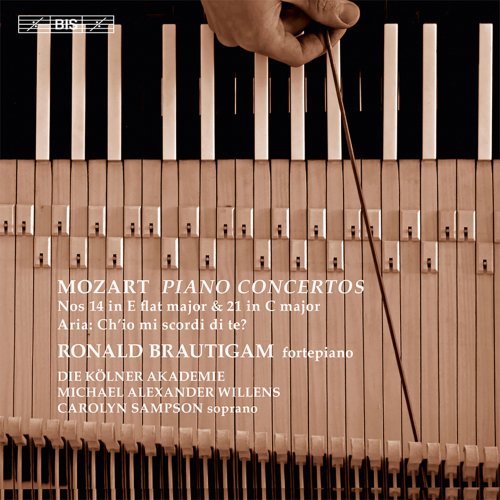
Ronald Brautigam, Orchester der Kölner Akademie, Michael Alexander Willens - Mozart: Aria & Piano Concertos (2014)
- Title: Mozart: Aria & Piano Concertos
- Year Of Release: 2014
- Label: BIS
- Genre: Classical
- Quality: flac lossless (tracks) +Booklet
- Total Time: 00:56:01
- Total Size: 231 mb
- WebSite: Album Preview
Tracklist
01. Piano Concerto No. 21 in C Major, K. 467: I. Allegro maestoso
02. Piano Concerto No. 21 in C Major, K. 467: II. Andante
03. Piano Concerto No. 21 in C Major, K. 467: III. Allegro vivace assai
04. Piano Concerto No. 21 in C Major, K. 467: Ch'io mi scordi di te, K. 505
05. Piano Concerto No. 14 in E-Flat Major, K. 449: I. Allegro vivace
06. Piano Concerto No. 14 in E-Flat Major, K. 449: II. Andantino
07. Piano Concerto No. 14 in E-Flat Major, K. 449: III. Allegro ma non troppo
Dutch fortepianist Ronald Brautigam, with the historical-instrument group Die Kölner Akademie under Michael Alexander Willens, has issued a good deal of music by Mozart, Haydn, and Beethoven on Viennese-style pianos, trying in most cases to chronologically match the music and piano. In this case, unlike with most of his Mozart recordings, he uses a copy by Americo-Czech fortepiano builder Paul McNulty (also present as piano technician) of an Anton Walter piano from 1805, not the 1792 instrument that served as a model for the pianos in his other Mozart performances. Some might or might not be a fan of Brautigam's dry approach and resolute lack of lyricism, but this is a way into his work for those looking to give him a try. The piano changed a lot between 1792 and 1805, and he seems to have wanted to experiment with how some of the vigorous concertos would turn out with it. The booming solo entrance in the first movement of the Piano Concerto No. 14 in E flat major, K. 449, justifies his instincts. The outer movements of the two piano concertos come out with a brilliant sound and a slightly madcap quality that fits with what is known of Mozart's personality. Another attraction here is the rarely performed recitative and rondo Ch'io mi Scordi di Te?, K. 505, for soprano, orchestra, and obbligato piano, composed for English singer Nancy Storace and nicely realized here by soprano Carolyn Sampson. Yet again, this aria emerges with a gorgeous spatial freedom in the engineering by BIS, executed at the ideal Deutschlandfunk chamber music studio in Cologne. A worthy entry in Brautigam's ongoing series.
01. Piano Concerto No. 21 in C Major, K. 467: I. Allegro maestoso
02. Piano Concerto No. 21 in C Major, K. 467: II. Andante
03. Piano Concerto No. 21 in C Major, K. 467: III. Allegro vivace assai
04. Piano Concerto No. 21 in C Major, K. 467: Ch'io mi scordi di te, K. 505
05. Piano Concerto No. 14 in E-Flat Major, K. 449: I. Allegro vivace
06. Piano Concerto No. 14 in E-Flat Major, K. 449: II. Andantino
07. Piano Concerto No. 14 in E-Flat Major, K. 449: III. Allegro ma non troppo
Dutch fortepianist Ronald Brautigam, with the historical-instrument group Die Kölner Akademie under Michael Alexander Willens, has issued a good deal of music by Mozart, Haydn, and Beethoven on Viennese-style pianos, trying in most cases to chronologically match the music and piano. In this case, unlike with most of his Mozart recordings, he uses a copy by Americo-Czech fortepiano builder Paul McNulty (also present as piano technician) of an Anton Walter piano from 1805, not the 1792 instrument that served as a model for the pianos in his other Mozart performances. Some might or might not be a fan of Brautigam's dry approach and resolute lack of lyricism, but this is a way into his work for those looking to give him a try. The piano changed a lot between 1792 and 1805, and he seems to have wanted to experiment with how some of the vigorous concertos would turn out with it. The booming solo entrance in the first movement of the Piano Concerto No. 14 in E flat major, K. 449, justifies his instincts. The outer movements of the two piano concertos come out with a brilliant sound and a slightly madcap quality that fits with what is known of Mozart's personality. Another attraction here is the rarely performed recitative and rondo Ch'io mi Scordi di Te?, K. 505, for soprano, orchestra, and obbligato piano, composed for English singer Nancy Storace and nicely realized here by soprano Carolyn Sampson. Yet again, this aria emerges with a gorgeous spatial freedom in the engineering by BIS, executed at the ideal Deutschlandfunk chamber music studio in Cologne. A worthy entry in Brautigam's ongoing series.
As a ISRA.CLOUD's PREMIUM member you will have the following benefits:
- Unlimited high speed downloads
- Download directly without waiting time
- Unlimited parallel downloads
- Support for download accelerators
- No advertising
- Resume broken downloads


